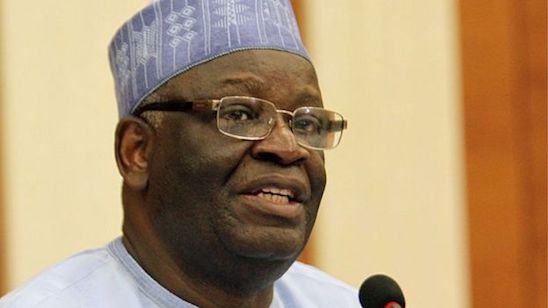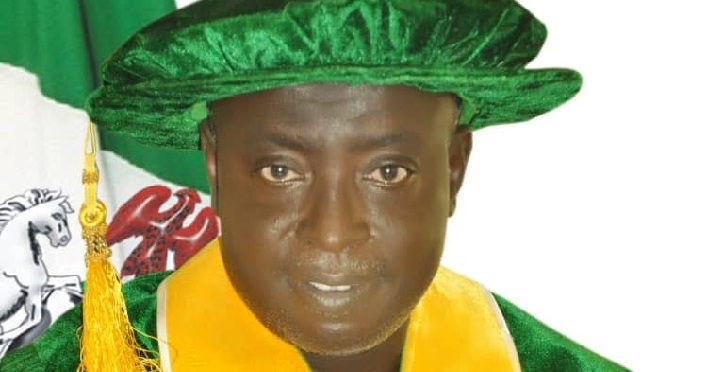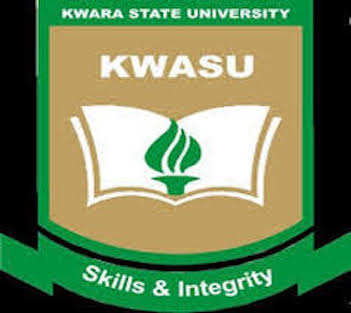Education
Nasarawa Varsity Confers Honorary Degree on Gambari, others

Nasarawa University, Keffi, has conferred a Honorary Degree (Honoris Causa) on President Muhammadu Buhari’s Chief of Staff, Prof. Ibrahim Gambari for his contributions to the country in his fields of endeavours.
The management of the university conferred the degree on Gambari at the Institution’s 7th Convocation ceremony held in Keffi Local Government Area on Saturday.
The News Agency of Nigeria (NAN) reports that also conferred another Honorary Degree on a 93-year-old renowned Polish Scholar, Prof.
Brunon Holyst.NAN also reports that Gambari was conferred with the Honorary Doctor of Letters (D.Litt), while Holyst was conferred with the Honorary Doctor of Philosophy (D.
Phil).Speaking on the conferment, Gov. Abdullahi Sule described the honour as well deserved, adding that the duo have distinguished themselves in their various fields of endeavours.
He thanked them for their contributions to the development of the university and the academia in general.
Sule also assured that his administration would continue to prioritise the education sector as education remains the most endearing legacy parents can bequeath to their children.
He said: “I make bold to say that no amount of investment and sacrifice is too much to provide quality education considering its envious importance in tackling insecurity and other vices.
“It is for this reason that we have sustained our commitment to the education sector since our assumption of office. ”
The Vice-Chancellor of the Institution, Prof. Suleiman Bala-Mohammed said that the gestures were due to the significant contributions made by both awardees to human endeavours.
He also said the duo have contributed in various ways to improving educational standards at the university, hence the approval of the university’s Senate to award them the degrees.
“Prof. Ibrahim Gambari is being conferred with a Honorary Doctorate Degree for his tremendous role in Nigeria’s foreign policy, being one of Nigeria’s longest serving Ambassadors to the United Nations.
“While Prof. Holyst Brunon isa renowned Professor of Criminology, Victimology and Criminalistic Psychology at the Management Academy of Applied Science in Warsaw, Poland.
“He is being conferred with a Honorary Doctorate Degree in recognition of his immense contributions to the academic community especially in the field of criminology and Criminalistics Psychology,” he said.
The vice-chancellor said that for the undergraduate programme, 5,984 graduands were found worthy to be awarded first degree in various disciplines.
According to Bala-Mohammed, for the postgraduate programme, 1,677 graduands were awarded various postgraduate degrees.
He said: “The breakdown of the undergraduate programme is as follows: First Class 33, Second Class Upper 1,598. Second Class Lower 3,906, with Third Class graduands numbering 447.
“For the postgraduate programme, Phd graduands are 134, Academic Masters 633, Professional Masters 357 and Postgraduate Diploma graduands numbering 553. I congratulate all the graduands.”
In a remark, Gambari, who described his presence at the university as a home-coming expressed joy over the conferment, adding, ”I accepted the honour with great sense of privilege.
”I will dedicate the rest of my life to the service of the Institution, Nigeria and the international community as a whole.”
In his own remarks, Holyst, who described the conferment on him as a surprise, however admitted,”It is a dream come true and i will always relish the honour bestowed on me by school.
“I would like to express my sincere gratitude to management of the university for accepting me into their academic community. The degree granted me has brought me immense pride.”
Holyst also delivered the Pre-Convocation lecture titled : A New Approach to Criminology: A Global Perspective”. (NAN)
Education
UNICAL VC Promises to Resolve Dentistry Students’ Crisis

From Ene Asuquo, Calabar
The Vice Chancellor of the University of Calabar, Prof. Florence Obi has promised that she would do everything humanly possible to ensure that the ongoing crisis in the institution’s Department of Dentistry, is resolved.
Prof.
Obi made the promise in Calabar during a press briefing, stressing that she will resolve the crisis before leaving office.She explained that the problem predates her administration, and pledged to intensify efforts to rectify the crisis.
She added that the crisis was as a result of the Medical and Dental Council of Nigeria (MDCN)’s refusal to induct 2016 Dentistry students of the institution.She also debunked claims circulating on social media that the institution’s Dentistry programme has lost its accreditation, describing the reports as “misinformation and distortion of facts,” clarifying that the programme remains fully accredited and no students have been directed to transfer to other universities.
“At no point did the University ask Dentistry students to seek transfers to other institutions, nor were they advised to ‘go and learn a trade’ as falsely alleged online,” the VC stated.
“I will feel very bad if I leave without solving this problem and the students are left hanging without knowing their fate. I won’t be fulfilled,” she said.
She reaffirmed the University’s commitment to ensuring all Dentistry students graduate and are duly licensed as dental surgeons.
She noted that the Dentistry programme commenced in the 2013/2014 academic session, and in November 2019, the University secured pre-clinical accreditation from the MDCN and full clinical accreditation was subsequently granted in December 2022.
The VC added that the university’s synergy and partnership with the Minister of Education and the Tertiary Education Trust Fund (TETFund) to upgrade its facilities.
“All we asked for is time to engage with other institutions, update the Medical and Dental Council of Nigeria (MDCN), and follow through on due processes,” she noted.
Speaking further, Obi said that some of the affected students demanded to be transferred to the Department of Medicine and Surgery but said it was not the solution as the department was already saturated.
She urged the affected students to remain calm, noting that the university was doing everything possible to resolve the issues before the end of her tenure.
Education
NUT Reaffirms Commitment to Teachers’ Professional Development in Kwara

From Abdullahi Abubakar, Ilorin
The Nigeria Union of Teachers (NUT), Kwara State Wing has restated its commitment to strengthening the professional growth of teachers across the State, to enhance the quality of education delivered in public schools. Speaking at the opening of a three-day capacity-building workshop in Ilorin, the State Chairman of the Union, Comrade Yusuf Wahab Agboola, noted that continuous training of teachers remains a vital component of educational reform and improved classroom delivery.
The training, organised in collaboration with the NUT National Secretariat, is targeted at selected teachers and focuses on the “Study Circle Conveners’ Model”—a grassroots strategy for enhancing peer-to-peer learning and participatory leadership within the education sector.
Comrade Agboola explained that the workshop aims to equip teachers with practical skills in collaborative learning, peer engagement, and innovative teaching practices. He expressed optimism that the training would promote professional bonding among teachers and foster collective solutions to challenges facing the education sector.Also speaking at the event, the National Coordinator of the NUT Study Circle Project, Comrade Solomon Igbelowowa, traced the initiative’s roots to 1985 when it was introduced in Nigeria by the Swedish Teachers Association, having recorded success in Sweden and other parts of the world. He commended the Nigerian Union of Teachers for sustaining the project over the years and urged participants to engage fully and make the most of the training opportunity.
The workshop was officially declared open by the National President of the NUT, Audu Amba, who was represented by the 3rd National Vice President, Bashir Oyewo.
He encouraged teachers to approach the sessions with dedication and punctuality.
Education
JAMB Sets 150 Cut-off Mark for University Admissions

By Tony Obiechina Abuja
The Joint Admissions and Matriculation Board (JAMB) has fixed 150 as the minimum cut-off mark for admission into Nigerian universities for the 2025/2026 academic session.
The decision was reached on Tuesday during the 2025 Policy Meeting on Admissions, held at the Bola Ahmed Tinubu International Conference Centre in Abuja, with stakeholders from various tertiary institutions in attendance.
According to JAMB, 140 was approved as the minimum score for colleges of nursing sciences, while polytechnics, colleges of education, and colleges of agriculture will admit candidates with a minimum score of 100.
“The minimum admissible scores for admissions for the next academic session have been fixed at 150 for universities, 100 for polytechnics, 100 for colleges of education, and 140 for colleges of nursing sciences by the stakeholders (Heads of Tertiary Institutions),” JAMB announced via its official X account.

























